| SHADOWS ON THE WALL | REVIEWS | NEWS | FESTIVAL | AWARDS | Q&A | ABOUT | TALKBACK | |||||
 Shadows off the beaten path Shadows off the beaten pathIndies, foreign, docs and shorts...
On this page:
FRAMING AGNES |
1946: THE MISTRANSLATION THAT SHIFTED CULTURE |
NOTHING LASTS FOREVER
| |||||
| See also: SHADOWS FILM FESTIVAL | Last update 15.Feb.23 | |||||
|
Framing Agnes Review by Rich Cline |  MUST
MUST  SEE SEE
| |||||
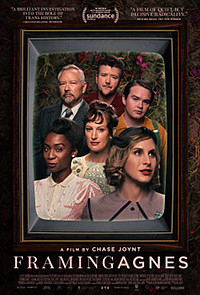 dir Chase Joynt scr Chase Joynt, Morgan M Page prd Samantha Curley, Shant Joshi, Chase Joynt with Zackary Drucker, Chase Joynt, Jules Gill-Peterson, Angelica Ross, Jen Richards, Max Wolf Valerio, Silas Howard, Stephen Ira, Kristen Schilt, Brian Michael Smith, Morgan M Page, Laverne Cox release UK Mar.22 flare, Can 9.Dec.22, US 17.Sep.23 22/Canada 1h15 SUNDANCE FILM FEST  See also:  Now streaming... |
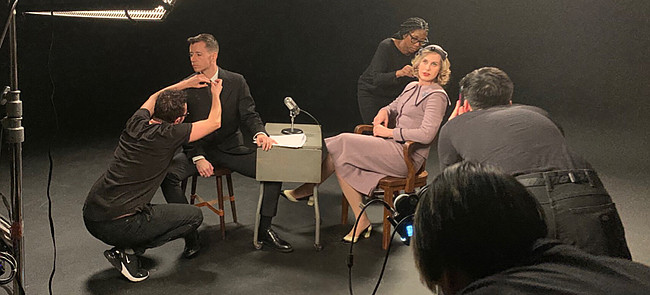 Opening as a re-enaction of a 1950s documentary, this inventive film crushes decades of studies based on erroneous information, including the notion that everyone is born simply "boy" or "girl". Expanding his 2018 short, filmmaker Chase Joynt deconstructs drama, documentary and pastiche in a way that's riveting and entertaining. And because it's infused with sharp humour, we barely realise that a seriously important point is sneaking up on us. In the late 1950s, Agnes (played by Drucker) heroically lied her way into a clinic in order to receive gender reassignment surgery, inspired by celebrity trans woman Christine Jorgensen. Doctors at UCLA were used to treating patients who existed outside what were considered to be gender norms, and the film is based on case studies of a collection of people whose treatment was documented in files that were lost for 60 years. These people have a lot to say to us today about both where we are in society and where we need to be. One of the main ideas the film challenges is that Agnes' story is even remotely exceptional. And yet trans lives have been repeatedly sensationalised in the media, which of course only sends these people into hiding and perpetuates bigotry. In to-camera interviews, experts explore the connections throughout history, while behind-the-the-scenes footage offers fascinating commentary as historical interviews are re-enacted verbatim. So there are multiple planes of observation in which people speak consistently about experiences, their refusal to lose themselves and their joy in meeting others like them. Conversational in nature, the film adds another meta-angle in interviews with the actors who play the case-study roles, exploring commonalities while digging into larger themes. This offers a remarkable insight into the words these archival documents recorded, and it also reminds us that trans people have been around throughout human history, facing the same issues as today. It's an astute and vitally important discussion of the larger themes from people who know exactly what they're talking about. History has been told to us through the straight, white lens of those in power. As Ross notes, "We have always heard the stories of the hunter, not of the lion who fought back and got away." And indeed, these experiences aren't the same for a vulnerable person as someone with privilege. So the film feels vital as it grapples with connections between racism, sexism and religion-based prejudice, noting that in some places just existing is considered a crime.
| ||||
|
1946: The Mistranslation That Shifted Culture Review by Rich Cline | 
| |||||
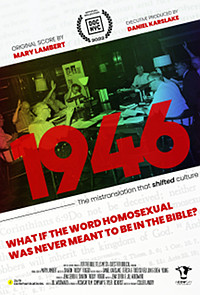 dir Sharon "Rocky" Roggio scr Jena Serbu, Jill Woodward prd Jena Serbu, Sharon "Rocky" Roggio with Kathy Baldock, Ed Oxford, Sharon "Rocky" Roggio, David Fearon, Salvatore Roggio, Trevor Thompson, David Potter, Angela N Parker, Cheryl Anderson, Steven Greenberg, Netto Montoya, Leticia Trowbridge release US Nov.22 dnyc 22/US 1h32 PALM SPRINGS FILM FEST Now streaming... |
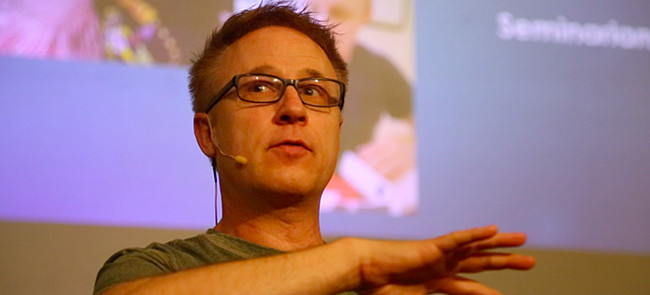 Aimed at viewers who know their way around the Bible, this documentary features people who take Christianity seriously as they take on a hot potato topic: looking into what the Bible actually says about homosexuality. Using scholarly research, the film finds proof of mistranslations that have led to misunderstandings, extensive abuse and ruptured relationships. And filmmaker Sharon Roggio is grappling with this topic in a way that's remarkably personal. The most widely read book in history, the Bible has been repeatedly translated from its original Hebrew, Aramaic and Greek over the millennia. But the first time the word "homosexual" appeared in 1946's Revised Standard Version, when two Greek words were combined into one English word. Digging into the original text, it becomes very clear that this was a mistranslation. The translators knew it at the time, but the wording spread over subsequent decades. So the verses churches quote on the topic, from both the Old and New Testaments, have clearly been quoted in error. The conflated words (malakoi and arsenokoitai) do not have clear meanings, but generally refer to hedonism and control. So the film follows scholars who dig into the context, revealing that biblical references refer to rape and abuse rather than homosexuality. A note from a 1946 RSV translator warns that using the word "homosexual" is dangerous, because it gives narrow-minded people a "sacred weapon". Which is exactly what happened in the late 1970s as anti-gay propaganda begins to appear in subsequent translations. Filmmaker Roggio's father Salvatore is a Christian preacher who continues to debate her on this topic. From a very early age, she knew she had to keep her true self a secret, and then as a teen she had no choice but to leave home. The film also traces the experiences of Kathy and Ed, religious-minded experts who have researched how the Bible was translated, spurred by their own experiences. Kathy felt called to build a bridge with gay people; Ed hid his sexuality, attended seminary and continues to search for answers. The film details how this mistranslation so comprehensively entered evangelical culture. So the red-flag statement "the Bible says" is likely to be followed by an opinion based on an error. Even worse, these mistranslations have lead to decades of horrific violence and suicide. So the film becomes a challenge to believers that they must understand the nature of this ancient book and what it actually says. And there's only hope if we keep talking to each other.
| ||||
|
Nothing Lasts Forever Review by Rich Cline | 
| |||||
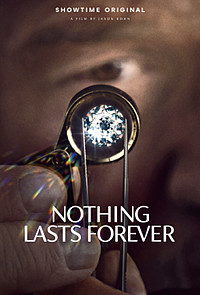 dir Jason Kohn prd Jason Kohn, Amanda Branson Gill, Jared Goldman with Dusan Simic, Aja Raden, John Janik, Stephen Lussier, Martin Rapaport, Tehmasp Printer, Melvyn Thomas, Chandu Sheta release US 11.Nov.22, UK 10.Feb.23 22/US Showtime 1h27 BERLIN FILM FEST Now streaming... |
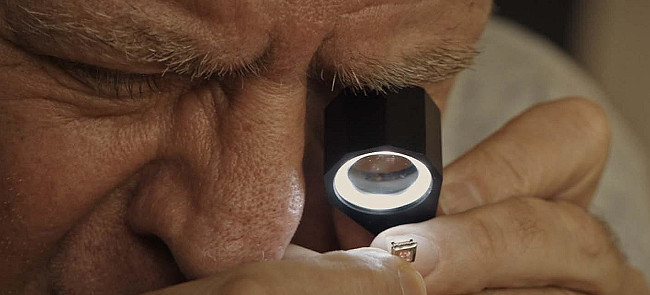 Centring on how today's most experienced gemologists can't identify a synthetic diamond, this documentary explores the worth people place on a stone, and by connection themselves. Filmmaker Jason Kohn unpicks how diamonds are overvalued by romantic notions, and how diamond companies work to maintain high prices by crushing alternatives. The film is strikingly well-constructed to build a sense of intrigue. And what it reveals about human nature is fascinating. In the 20th century, the diamond company De Beers created an artificial image for diamonds as the ultimate symbol of love and permanence. Because a natural diamond is formed over millions of years, it is given exponential value. But it's actually one of the most common gems on earth. And now technology has evolved that makes it impossible to detect whether a diamond is natural or cultured. Still, established companies continue to give finely cut rocks exotic names and fictional backstories to inflate their worth. And facing competition, they've started growing diamonds in labs themselves. Cameras capture a range of people discussing the issue, and it becomes apparent that the old guard is hugely protective of their global trading system, seeing synthetic stones as a threat to their business. In fact, De Beers is part of a powerful cartel. But others see competition as a good thing. The film follows the history of lab-grown stones, which were initially made for industrial use, and then how the process improved over the decades and began to shift into the jewellery market, leading to systemic fraud that includes false claims about what is and is not legitimate. As gemologist Simic observes, everything about cultured stones is better, and they're also cheaper, but some people want something that belongs to the earth. Or as diamond valuator Rapaport notes, "You talk differently if you have cash in your pocket." At the same time, synthetic diamond pioneer Janik believes natural stones are vastly overvalued, and that the diamond industry deserves to be taken down for profiteering. He also sees more potential for diamonds in the tech industry than as jewellery. Fascinatingly, the established industry says they want to protect the "diamond dream", which they see as under threat from lab-grown stones. Others point out that they are actually just fighting to perpetuate a myth that inflates their income. Meanwhile, India and China have emerged as the world's diamond clearinghouses, and natural and cultured diamonds are increasingly mixed together. The salient question is whether that actually matters, if wealthy people are happy to embrace a myth.
| ||||

See also: SHADOWS FILM FESTIVAL © 2023 by Rich Cline, Shadows
on the Wall
HOME | REVIEWS | NEWS | FESTIVAL | AWARDS
| Q&A | ABOUT | TALKBACK | | ||||

